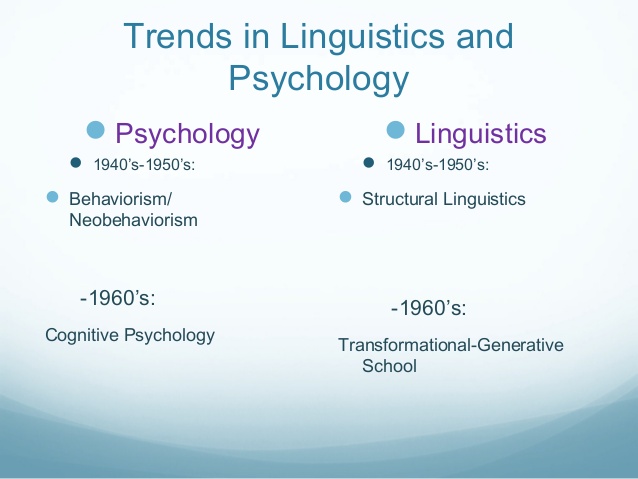The relationship between Psychology and linguistics is one of the important cornerstones in the implementation of education. Therefore, educators must know what to do to with students in every different stage of development.
The cornerstone of psychology has a role important in education both in teaching and learning, especially Theory of Learning. Knowledge of psychology is required by the teacher or instructor, educators, teachers, coaches, counselors and caregivers in understanding the characteristics of language.
Etymologically the word psychology is derived from the ancient Greek word psyche and logos. The word psyche means soul, spirit, or soul, while the word logos mean knowledge. So psychology literally means the science of life or the science object of study is the soul. Back when psychology was still a part of the philosophy of science, the definition of that psychology is a science that examines the soul can still be maintained. However, now the term psychology is no longer used because the field is not researching the soul or the spirit, or the soul so that it is less precise term.
In a further development, psychology is discussing or reviewing of the sides of the human terms that can be observed. In its development, psychology has been divided into several streams according to understand the philosophy adopted.
Mentalist psychology aimed at trying to assess the process of the human mind by means of introspective or self-examination. Therefore, the psychology of consciousness commonly also called introspectionist psychology. This psychology is a process sense by looking at you as a stimulus that occurs.
Behaviorist psychology is also very important in linguistics. The main objective of this behavioral psychology is trying to study the processes of the human mind in the form of a reaction when a stimulus occurs, and then how to supervise and control the behavior. Cognitive psychology tries to assess scientifically the human cognitive processes. The main thing that is studied by how humans acquire, interpret, organize, store, dispense, and use of knowledge, including the development and use of language knowledge.
Know The Most Important Elements Of Psychology and linguistics
Linguistics
It is understood that the study of linguistics has undergone three stages of development, the first stage is called the stage of speculation, the second stage is the stage of observation and classification, and the third stage is called the stage of formulation of the theory. At the stage of speculation, a statement about the language is not based on empirical data, but rather on a mere fairy tale or fiction. At the stage of classification and observation linguists make observations and classification of the languages under investigation, but have not come to formulate a theory. Therefore, their work cannot be said to be scientific.
New scientific investigations carried out on the third stage, where the language studied not only observed and classified, but also has made his theories. In the history of development, linguistic filled with a variety of streams, understood, approaches, and techniques of investigation from the outside it seems very complicated, contradictory, and confusing. However, in fact everything that will add insight to the plane and linguistic studies. Here will be described the flow of linguistics.
Generally linguistic commonly defined as the science of language or science that takes language as the object of study. Linguists are known as people who are proficient in several languages. If it is said that it is the science of linguistics object of study is the language, while the language itself is a phenomenon that is present in all activities of human life, then it becomes a very broad field of linguistic studies. Therefore, we can see the various branches of linguistics are made based on various criteria or views.
First, According to the object of study, linguistics can be divided into two major branches, namely linguistic macro and micro linguistics. The macro linguistic study has its own internal structure that includes phonology, morphology, syntax and lexicon. While the micro-language linguistics in relation to factors outside the language as a factor sociological, psychological, anthropological, neurology.
Secondly, according to the study, linguistics can be divided into two major fields that theoretical linguistics and applied linguistics. Only theoretical study aimed to look for or find mere linguistic theories. Third, the so-called linguistic history examines the development and changes of a language or a set of languages, both with comparable or not. The historical linguistics, study the development of linguistics, the characters, streams theory, and the results of its work.
In relation to psychology, linguistics commonly defined as the science that tries to learn the nature of language, the structure of the language, how language evolved.
To provide a tabular comparison of psychology and linguistics, let’s consider key aspects such as their definitions, primary focus, methods of study, real-world applications, and notable theorists in each field. Here’s a table that contrasts these two disciplines:
| Aspect | Psychology | Linguistics |
|---|---|---|
| Definition | The scientific study of the human mind and behavior. | The scientific study of language and its structure. |
| Primary Focus | Human behavior, mental processes, and emotions. | Language structure, use, and development. |
| Methods of Study | Experiments, observation, surveys, case studies. | Analysis of spoken and written language, fieldwork. |
| Real-World Applications | Therapy, education, human resources, mental health services. | Language education, translation, computational linguistics. |
| Notable Theorists | Sigmund Freud, B.F. Skinner, Carl Jung. | Noam Chomsky, Ferdinand de Saussure, Roman Jakobson. |
This table highlights how psychology focuses on understanding the human mind and behavior, employing methods like experiments and case studies, and has applications in various fields like therapy and education. In contrast, linguistics deals with the structure and use of language, relying on language analysis and fieldwork, and has applications in areas like language education and computational linguistics. Both fields have been shaped by influential theorists, such as Freud and Skinner in psychology, and Chomsky and Saussure in linguistics.
